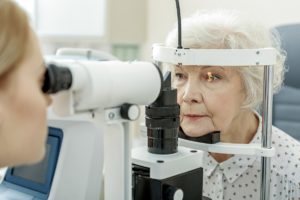What You Need to Know About Drusen
Submitted by Elman Retina Group on August 16, 2020
 Clear communication with patients is one of an eye doctor’s most important responsibilities. If you do not understand the medical jargon used during an eye exam, you are less likely to take the necessary steps to manage your ocular health. Hearing words like “drusen” mentioned during an exam and not understanding what it means can lead to feelings of confusion, uncertainty and even anxiety about your eye health.
Clear communication with patients is one of an eye doctor’s most important responsibilities. If you do not understand the medical jargon used during an eye exam, you are less likely to take the necessary steps to manage your ocular health. Hearing words like “drusen” mentioned during an exam and not understanding what it means can lead to feelings of confusion, uncertainty and even anxiety about your eye health.
Fortunately, the retinal specialists at Elman Retina Group are here to set the record straight about drusen. Read on as we explain what you should know.
Understanding Drusen
Drusen is a German word translating roughly to “rocks.” These yellowish deposits of extracellular waste form under the retina, the light-sensitive tissue lining the back of the eye. Women and adults over the age of 60 are most likely to develop drusen.
Some drusen, particularly small drusen, do not cause any noticeable visual symptoms. Only a dilated eye exam can reveal their presence.
Are Drusen Serious?
Small drusen are generally harmless. On the other hand, large drusen or increased amounts of drusen are associated with an increased risk of early or “dry” age-related macular degeneration (AMD).
AMD is a leading cause of vision characterized by the gradual breakdown of the macula, the portion of the retina responsible for sharp central and detail vision. As the cells of the macula die off, it can cause blank or blurry spots in central vision, hazy vision or difficulty adapting from a brightly lit room to a poorly lit room. Another symptom associated with AMD is the illusion of straight lines (such as those on a grid) appearing wavy.
What Should I Do If My Doctor Detects Drusen?
Small drusen usually do not require treatment, but you may be encouraged to continue to have routine eye exams to monitor the drusen and watch them to see if they enlarge or multiply.
If larger drusen are detected during an eye exam, additional tests or tools like an Amsler grid may be used to check for AMD. If your doctor confirms an AMD diagnosis, inquire about starting a specific kind of nutritional supplement. Some scientific evidence suggests that people with dry AMD can benefit from taking supplements with the AREDS2 formula. The supplements can’t cure or reverse dry AMD, but they can delay or prevent dry AMD from worsening into advanced “wet” AMD.
Contact Our Retinal Specialists Today
For more information about age-related macular degeneration, please request an appointment with the team at Elman Retina Group.



